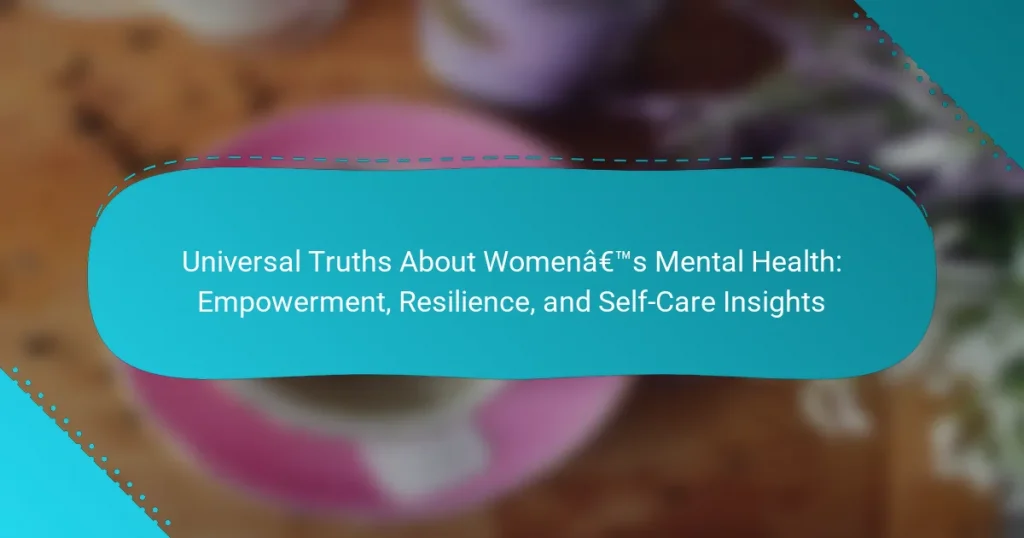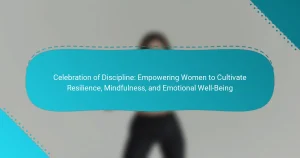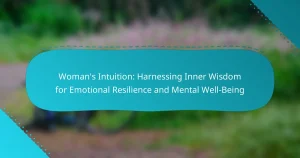Understanding women’s mental health is crucial for fostering empowerment and resilience. This article explores the unique challenges women face, the importance of self-care practices, and the role of community support. It highlights practical strategies for improving mental well-being and emphasizes the value of seeking professional help. Prioritizing these aspects can significantly enhance women’s overall mental health outcomes.
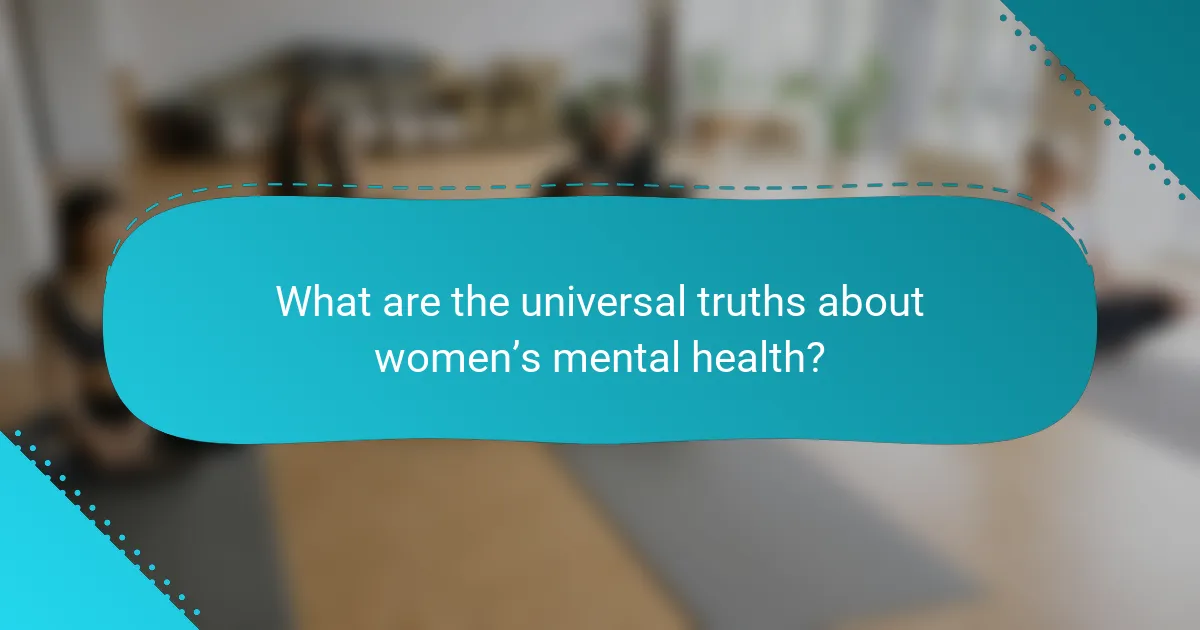
What are the universal truths about women’s mental health?
Women’s mental health is shaped by empowerment, resilience, and self-care practices. These universal truths highlight the importance of community support and self-advocacy. Studies indicate that women often face unique stressors, including societal expectations and caregiving roles, impacting their mental well-being. Resilience emerges as a critical factor, enabling women to navigate challenges and recover from setbacks. Self-care practices, such as mindfulness and physical activity, significantly enhance mental health outcomes. Prioritizing mental health fosters overall well-being and strengthens women’s capacity to thrive in various aspects of life.
How does empowerment influence mental wellness?
Empowerment significantly enhances mental wellness by fostering self-efficacy and resilience. When women feel empowered, they are more likely to engage in self-care practices, which directly support their mental health. Studies indicate that empowered individuals experience lower levels of stress and anxiety, promoting a positive outlook on life. Additionally, empowerment encourages social support networks, further bolstering emotional well-being.
What role does resilience play in coping strategies?
Resilience is crucial for effective coping strategies, enabling individuals to adapt to stress and adversity. It fosters a mindset that embraces challenges, enhances emotional regulation, and promotes problem-solving skills. Resilience helps women navigate mental health challenges by encouraging self-efficacy and a proactive approach to self-care. This unique attribute of resilience contributes significantly to overall mental well-being, allowing for a more empowered response to life’s difficulties.
Why is self-care essential for women’s mental health?
Self-care is essential for women’s mental health as it fosters empowerment and resilience. Engaging in self-care practices enhances emotional well-being and reduces stress. Studies show that women who prioritize self-care experience lower levels of anxiety and depression. Regular self-care activities, such as exercise, mindfulness, and social connections, significantly improve mental health outcomes. Prioritizing self-care empowers women to navigate challenges effectively and build resilience against mental health issues.
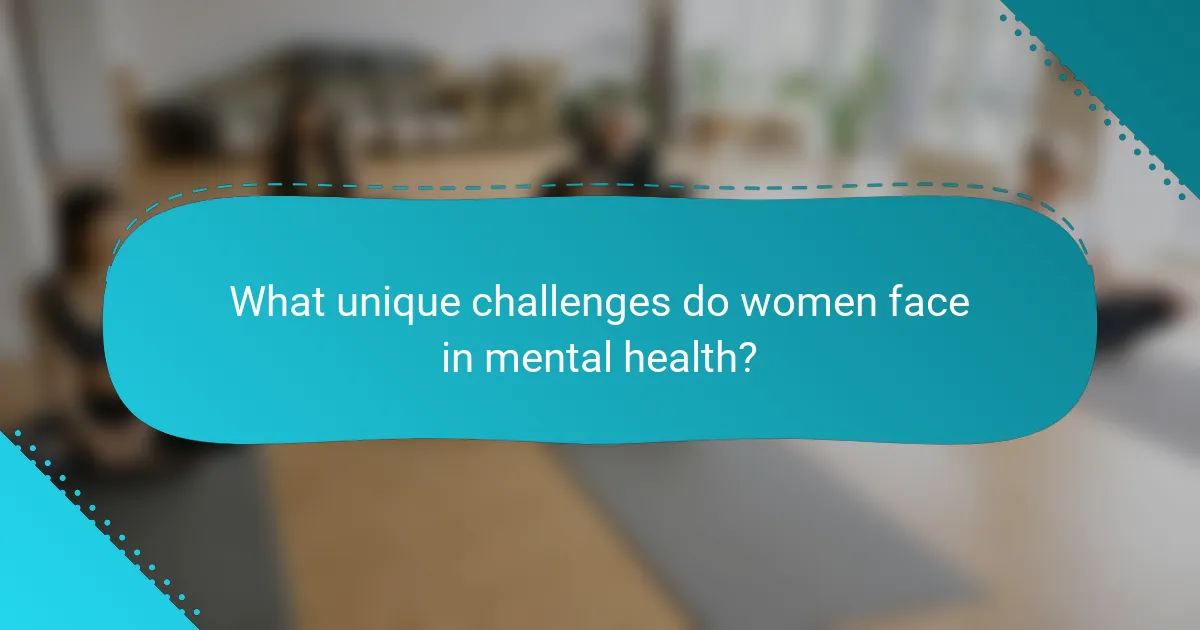
What unique challenges do women face in mental health?
Women face unique challenges in mental health, including societal pressures, stigma, and access to care. These factors can lead to higher rates of anxiety and depression. Women often juggle multiple roles, impacting their mental well-being. Additionally, hormonal fluctuations can influence mood and mental health conditions. Addressing these challenges requires tailored support and resources focused on empowerment and resilience.
How do societal expectations impact mental wellness?
Societal expectations significantly impact women’s mental wellness by shaping self-perception and resilience. Pressure to conform to traditional roles can lead to anxiety and low self-esteem. Empowerment through self-care practices fosters resilience, allowing women to challenge these norms. Studies show that supportive environments enhance mental health outcomes, promoting a sense of belonging and well-being.
What are the effects of hormonal changes on mental health?
Hormonal changes significantly impact women’s mental health, influencing mood, anxiety, and cognitive function. Fluctuations in estrogen and progesterone can lead to symptoms such as depression and irritability. Research indicates that women are more susceptible to mood disorders during hormonal transitions, including puberty, menstruation, pregnancy, and menopause. For example, premenstrual syndrome affects approximately 50-80% of menstruating women, highlighting the prevalence of these effects. Understanding these changes can empower women to seek appropriate self-care strategies and professional support.
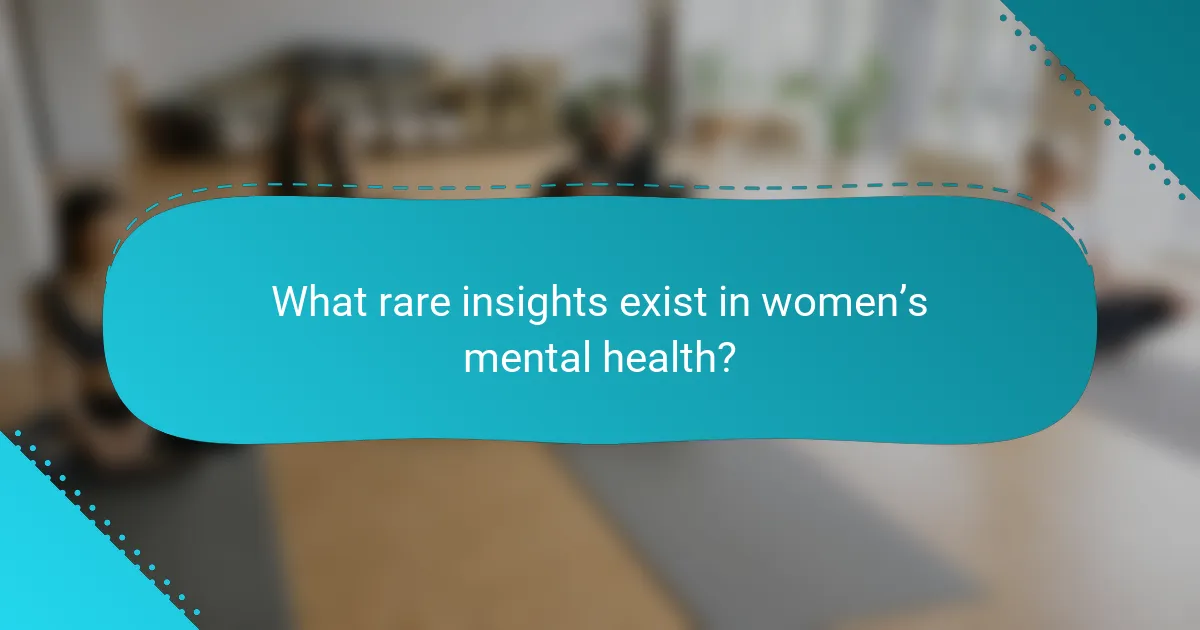
What rare insights exist in women’s mental health?
Rare insights in women’s mental health reveal unique patterns of resilience and empowerment. Research indicates that women often employ social support as a coping mechanism, enhancing their mental well-being. Additionally, studies show that women are more likely to experience anxiety disorders, yet they demonstrate remarkable adaptability in facing these challenges. Self-care practices, such as mindfulness and community engagement, significantly contribute to their mental health resilience. Understanding these dynamics can lead to better-targeted interventions and support systems for women.
How can understanding intersectionality enhance mental health support?
Understanding intersectionality enhances mental health support by recognizing diverse experiences and identities. This approach allows for tailored interventions, addressing unique challenges faced by women from various backgrounds. By incorporating intersectionality, mental health services can improve empowerment, resilience, and self-care strategies. For example, women of color may encounter systemic barriers that affect their mental health, necessitating specific support frameworks. This nuanced understanding fosters a more inclusive environment, ultimately leading to better mental health outcomes.
What are the hidden impacts of trauma on women’s mental health?
Trauma significantly impacts women’s mental health by fostering conditions such as anxiety, depression, and PTSD. These hidden effects often manifest through emotional distress, disrupted relationships, and impaired self-esteem. Research indicates that women are more likely to experience trauma-related mental health issues due to societal pressures and gender-based violence. Empowerment and resilience strategies can mitigate these effects, promoting self-care as a crucial tool for recovery. Addressing trauma’s impacts fosters long-term mental well-being and enhances overall quality of life for women.
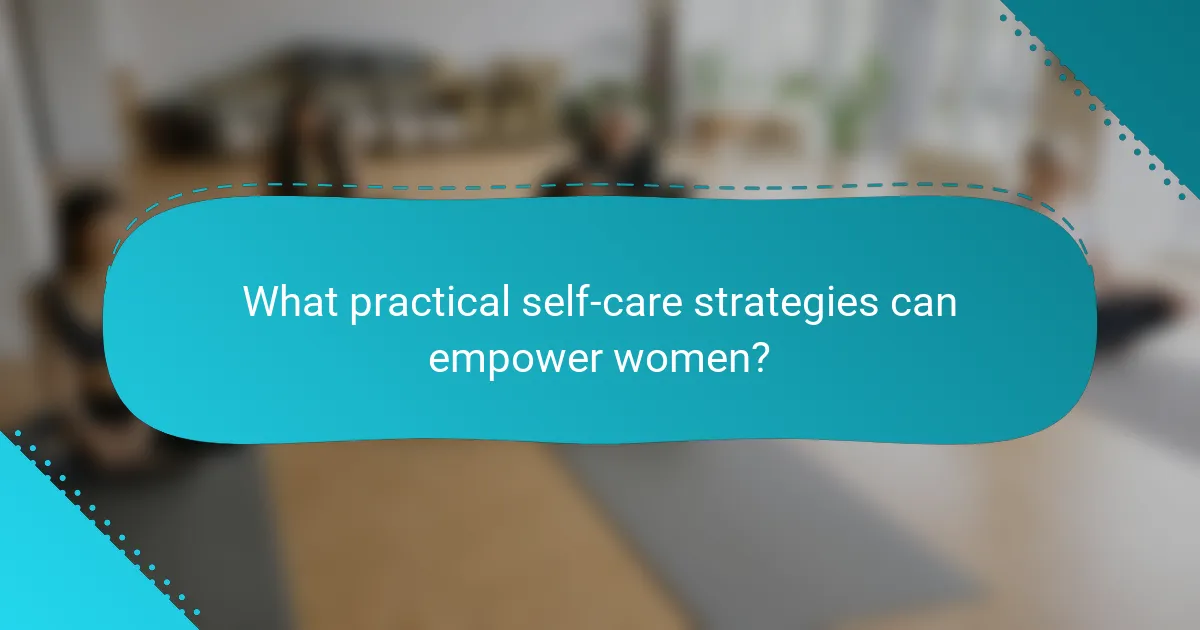
What practical self-care strategies can empower women?
Practical self-care strategies that empower women include mindfulness practices, physical activity, and social support. These approaches enhance mental health and resilience.
Mindfulness practices, such as meditation and journaling, improve emotional regulation. Engaging in regular physical activity boosts mood and reduces anxiety. Building a strong social support network fosters connection and provides encouragement during challenging times.
Women can also prioritize self-compassion and set boundaries to protect their mental well-being. These strategies create a holistic approach to self-care that empowers women to navigate life’s challenges effectively.
How can mindfulness practices improve mental health?
Mindfulness practices can significantly enhance mental health by promoting emotional regulation and reducing stress. These techniques encourage self-awareness, enabling women to identify and manage their emotions effectively. Research indicates that regular mindfulness meditation can decrease anxiety levels by up to 60% and improve overall well-being. Additionally, mindfulness fosters resilience, empowering women to cope with life’s challenges more effectively. Engaging in mindfulness exercises, such as deep breathing or guided meditation, can lead to greater self-care and improved mental clarity.
What are the best ways to build a supportive community?
Building a supportive community involves fostering connections, sharing experiences, and encouraging open dialogue. Prioritize creating safe spaces where women can express their mental health struggles and triumphs. Encourage regular meetups or online forums to facilitate discussions and share resources. Leverage social media to amplify voices and create awareness around women’s mental health issues. Offer workshops focused on empowerment, resilience, and self-care strategies. These initiatives enhance community bonds and provide essential support networks.
What resources are available for mental health support?
Various resources for mental health support exist, focusing on women’s empowerment and resilience. These include hotlines, online therapy platforms, community support groups, and educational workshops.
Hotlines provide immediate assistance and guidance, while online therapy platforms offer flexible access to licensed professionals. Community support groups foster shared experiences and connection, enhancing resilience. Educational workshops equip women with self-care strategies and coping mechanisms, promoting mental well-being.
Accessing these resources can significantly improve mental health outcomes for women, encouraging empowerment through knowledge and community support.
What common mistakes should women avoid in self-care?
Women should avoid neglecting their mental health, overcommitting to obligations, and dismissing self-care as selfish. Prioritizing mental well-being is essential for empowerment and resilience. Common mistakes include:
1. Ignoring emotional needs, which can lead to burnout.
2. Skipping regular mental health check-ins, reducing awareness of stress levels.
3. Comparing self-care routines to others, undermining personal effectiveness.
4. Failing to set boundaries, resulting in overwhelming responsibilities.
5. Overlooking the importance of social connections, which enhance emotional support.
6. Neglecting physical health, as it directly impacts mental wellness.
By recognizing and avoiding these pitfalls, women can cultivate a more effective self-care practice.
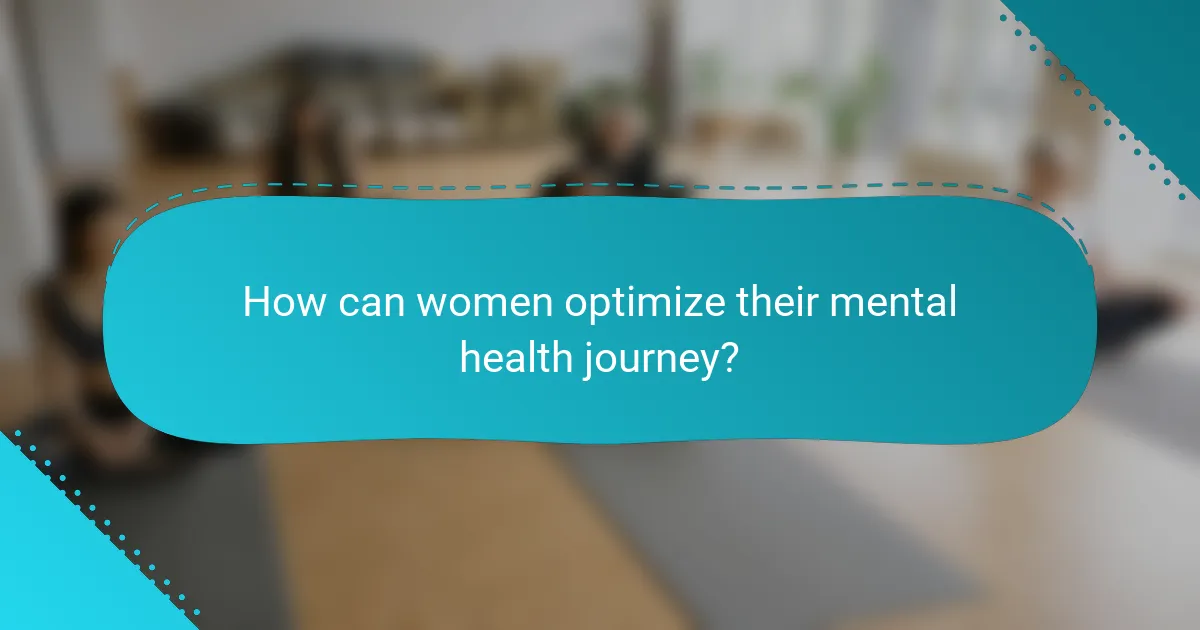
How can women optimize their mental health journey?
Women can optimize their mental health journey by prioritizing empowerment, resilience, and self-care. Engaging in regular self-reflection enhances self-awareness, which is crucial for mental wellness. Building a support network fosters resilience and provides emotional strength. Practicing mindfulness can significantly reduce anxiety and improve overall mental clarity. Establishing healthy routines, including exercise and balanced nutrition, contributes to better mental health outcomes. Setting realistic goals encourages a sense of achievement and motivation. Lastly, seeking professional help when needed is a vital step in navigating mental health challenges effectively.
What expert insights can guide effective mental wellness practices?
Empowerment, resilience, and self-care are crucial for effective mental wellness practices in women. Research shows that fostering a strong support network enhances resilience, allowing women to navigate challenges more effectively. Engaging in consistent self-care routines, such as mindfulness and physical activity, significantly improves mental health outcomes. Additionally, understanding the unique stressors women face can guide tailored approaches to mental wellness, promoting both individual and collective empowerment.
What are the key takeaways for lasting mental health empowerment?
Empowerment and self-care are essential for lasting mental health. Key takeaways include prioritizing self-awareness, fostering supportive relationships, and practicing resilience through coping strategies. Engaging in regular self-care activities enhances emotional well-being and promotes sustainable mental health practices. Additionally, understanding the unique challenges women face can guide effective empowerment strategies.
